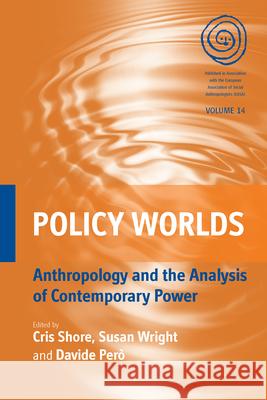Policy Worlds: Anthropology and the Analysis of Contemporary Power » książka
Policy Worlds: Anthropology and the Analysis of Contemporary Power
ISBN-13: 9780857451163 / Angielski / Twarda / 2011 / 348 str.
Policy Worlds: Anthropology and the Analysis of Contemporary Power
ISBN-13: 9780857451163 / Angielski / Twarda / 2011 / 348 str.
(netto: 485,11 VAT: 5%)
Najniższa cena z 30 dni: 503,14
ok. 30 dni roboczych.
Darmowa dostawa!
There are few areas of society today that remain outside the ambit of policy processes, and likewise policy making has progressively reached into the structure and fabric of everyday life. An instrument of modern government, policy and its processes provide an analytical window into systems of governance themselves, opening up ways to study power and the construction of regimes of truth. This volume argues that policies are not simply coercive, constraining or confined to static texts; rather, they are productive, continually contested and able to create new social and semantic spaces and new sets of relations. Anthropologists do not stand outside or above systems of governance but are themselves subject to the rhetoric and rationalities of policy. The analyses of policy worlds presented by the contributors to this volume open up new possibilities for understanding systems of knowledge and power and the positioning of academics within them.
There are few areas of society today that remain outside the ambit of policy processes, and likewise policy making has progressively reached into the structure and fabric of everyday life. An instrument of modern government, policy and its processes provide an analytical window into systems of governance themselves, opening up ways to study power and the construction of regimes of truth. This volume argues that policies are not simply coercive, constraining or confined to static texts; rather, they are productive, continually contested and able to create new social and semantic spaces and new sets of relations. Anthropologists do not stand outside or above systems of governance but are themselves subject to the rhetoric and rationalities of policy. The analyses of policy worlds presented by the contributors to this volume open up new possibilities for understanding systems of knowledge and power and the positioning of academics within them.











